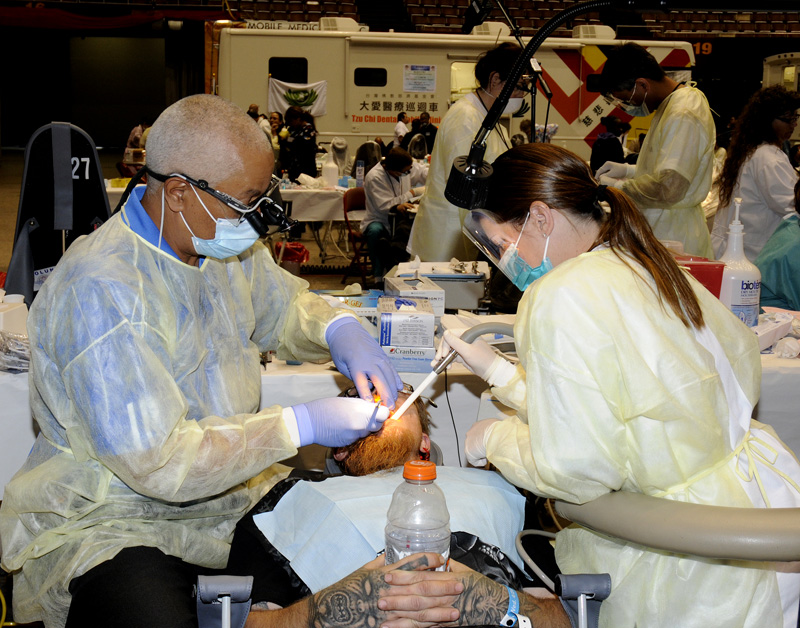Dr. Edmond Hewlett had seen his fair share of teeth over the course of two days of double shifts at the free medical clinic at the Los Angeles Memorial Sports Arena, but one set stood out.
When the patient lost his job once the truck driving service he worked for went under, he could afford to pay for the dental work his daughter needed, but that left little money to treat his own badly decayed incisors, Hewlett said. He came to the week-long free clinic to see about getting them fixed. But with an overwhelming need for dental work at the clinic, those providing dentistry treatment were told one filling per patient.
By the time the truck driver got up from the dentist’s chair, the associate professor of restorative dentistry had filled every tooth. “I don’t think it took a whole lot longer to get more than one done,” Hewlett said.
Hewlett is one of many UCLA medical faculty members and students who volunteered their time and skills in the clinic, sponsored by Remote Area Medical. The non-profit organization first served developing countries, but has since extended its services to U.S. metropolitan cities out of a growing need for medical care.
This visit marks the Tennessee-based group’s second Los Angeles visit; in August, it provided care for 6,344 patients at a clinic at The Forum. Through this year’s clinic, which opened April 27 and ended Monday, RAM set out to serve 1,200 of Los Angeles’ uninsured and underinsured each day. However, the group fell short of its goal because of a shortage of volunteer medical professionals.
Michael RodrÃguez, a professor of family medicine, coordinated much of the UCLA effort with the support of Dr. Eugene Washington, dean of the David Geffen School of Medicine. RodrÃguez said nearly 100 volunteers supported RAM’s efforts in some way by the week’s end. The volunteers, ranging from faculty members, medical students, fellows and even a few undergraduate students, represented the School of Medicine, the Jules Stein Eye Institute, the UCLA School of Dentistry and various medical departments.
“Their last visit seemed like a lost opportunity. This time, I wanted to make sure UCLA was involved as a sponsor,” RodrÃguez said. “We provide the best care, research, training, but we also want to be an important community member.”
Patient care included addressing acute needs as well as preventive treatment including PAP smears, mammograms and diabetes screening. Before they left the sports arena, patients were directed to specialists and clinics in their communities to ensure follow-up care.
Donna Henley-Jackson, a pediatric dentistry resident, spent time cleaning and extracting teeth before class. She described the wide range of treatments received by patients who had waited in line for hours for a wristband to gain entrance to the clinic.
“The long lines you saw on the news are not what you saw inside. It’s run like a well-oiled machine,” she said. “The patient doesn’t just come in for one service. They can have all the service they need, starting with dental. It’s really treatment from head to toe.”
The dentistry resident treated six patients, including a homeless man who feared many of his teeth had come loose after years without dental care. She directed another patient to the pharmacy, which was offering free nicotine patches ““ an act she recounts with some pride.
“I’ve never seen a more appreciative group of patients,” she said. “Everyone said “˜Thank you for your time,’ no one complained about the wait even though some had camped out to secure a spot.”
Though this year’s clinic was well-equipped for comprehensive care, by midweek, patients with wristbands were being told to come back Monday because of a short supply of volunteers.
“The patients I saw were all on the verge of losing their teeth or developing serious infections had they not been treated. … There’s a real need for help,” Hewlett said.
“Dental benefits are largely not included for adults in insurance packages or Medicaid and Medicare programs,” he added.
Hewlett said he decided to volunteer out of a desire to give back to the community and to rectify having missed out last year.
RodrÃguez also said UCLA’s effort was focused on giving back to those who have found medical care elusive. The number of uninsured and underinsured searching out organizations like RAM, he said, underscores the need for medical care across America, even as the health-care reform slowly takes effect.
“One of the priorities of the university is to address the needs of our community so that there are no longer needs and so that individuals, children and families can have access to quality health, vision and dental care,” he said. “But until we’re there, we need to do what we can through efforts like this.”

Keep it up guyz. Good deeds receives good things in return. Just be an inspiration to other dental practitioners…FocusDentalGroup.com